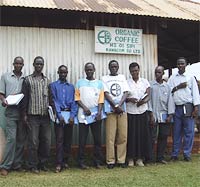ORGANIC AGRICULTURE
Organic agriculture is an advanced form of sustainable agriculture.
It promotes the (renewed) uptake of traditional techniques, while
incorporating modern knowledge on farming techniques and ecological
systems.
Many smallholder farms qualify as ‘organic by default’.
Agro-chemicals were used in the past, but farmers ceased to use
them because of high costs or no availability.
Organic farming is most appropriate in this situation because it
promotes the use of locally available manure or compost instead
of artificial fertiliser. Pesticides are prohibited and biological
control methods are encouraged.
In general, when a farm is converted to organic, a conversion period
of three years is required. In ‘organic by default’ situations
one can shorten this period to one year, or less.
Prices for certified organic products are higher than for conventional
products. On average this results in a premium over farm gate price
of 15-40%.
Organic food must be produced according to inter-national regulations.
Products need to be certified by a certifying body before a premium
price is paid. EPOPA is open to work with any IFOAM accredited certifier.
After having read through the tenders it was decided that IMO
and Naturland
manage certification in Tanzania, while KRAV
and Soil
Asssociation does the same in Uganda.
|


